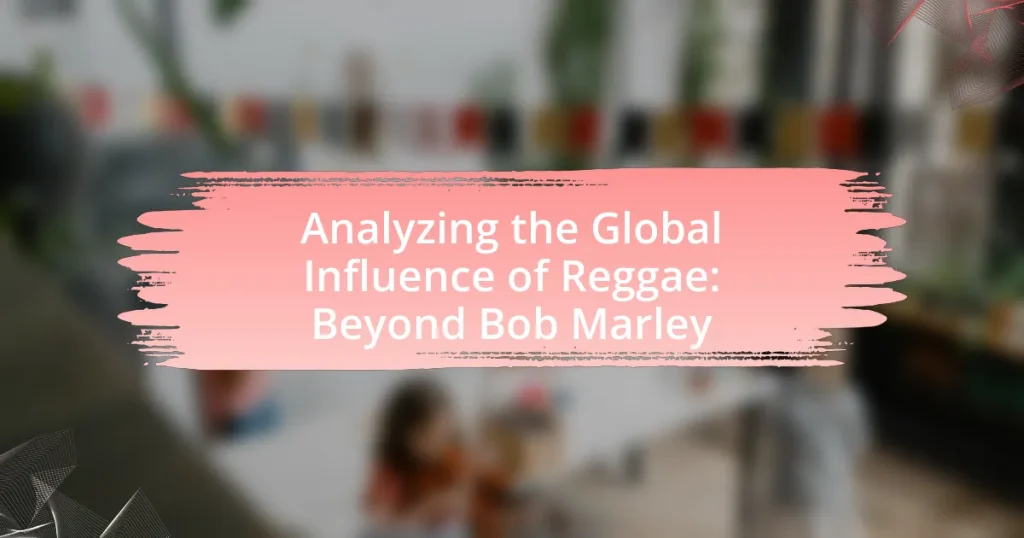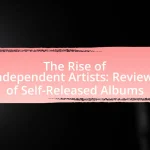The article analyzes the global influence of reggae music, highlighting its origins in Jamaica during the late 1960s and its evolution into a genre that has shaped various music styles and cultural movements worldwide. It discusses the significant contributions of artists like Bob Marley, who popularized reggae and its themes of social justice and unity, as well as the genre’s impact on contemporary music and activism. The article also explores the characteristics of reggae, its adaptation in different cultures, and the emerging trends and artists within the genre, emphasizing reggae’s enduring relevance and global appeal.
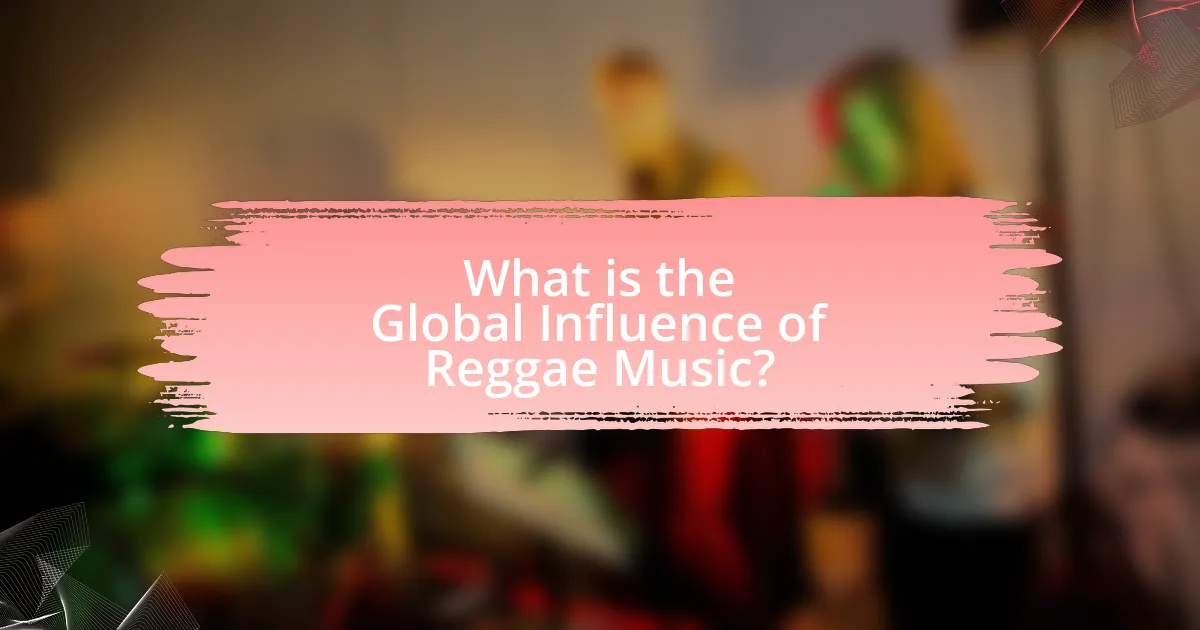
What is the Global Influence of Reggae Music?
Reggae music has a profound global influence, shaping various music genres and cultural movements worldwide. Originating in Jamaica in the late 1960s, reggae has transcended its local roots to impact artists across genres such as hip-hop, rock, and pop, with notable figures like The Police and Eric Clapton incorporating reggae elements into their music. The genre’s themes of social justice, resistance, and unity resonate globally, inspiring movements like the Rastafari movement and influencing political activism in various countries. Furthermore, reggae festivals and events, such as Reggae Sumfest in Jamaica and the Rototom Sunsplash in Spain, attract international audiences, showcasing the genre’s widespread appeal and cultural significance.
How did Reggae music originate and evolve over time?
Reggae music originated in Jamaica in the late 1960s, evolving from earlier genres such as ska and rocksteady. The genre is characterized by its distinctive rhythm, which emphasizes the offbeat, and its themes often address social issues, love, and spirituality. Reggae gained international recognition in the 1970s, largely due to artists like Bob Marley, who popularized the genre worldwide. The incorporation of Rastafarian themes and the use of traditional Jamaican instruments further shaped its development. Over time, reggae has influenced various music styles globally, leading to the emergence of subgenres like dancehall and reggaeton, demonstrating its lasting impact on the music landscape.
What cultural and historical factors contributed to the birth of Reggae?
Reggae emerged from a confluence of cultural and historical factors, primarily rooted in Jamaica’s socio-political landscape during the 1960s. The genre evolved from earlier musical styles such as ska and rocksteady, which reflected the island’s African heritage and the struggles against colonialism. The Rastafarian movement significantly influenced reggae, promoting themes of social justice, spirituality, and resistance against oppression, which resonated with the experiences of marginalized communities in Jamaica. Additionally, the socio-economic challenges, including poverty and inequality, fueled the desire for a musical expression that articulated the people’s struggles and aspirations. The global spread of reggae was further propelled by the rise of influential artists like Bob Marley, who brought international attention to the genre and its cultural significance.
How has Reggae music transformed since its inception?
Reggae music has transformed significantly since its inception in the late 1960s, evolving from its roots in ska and rocksteady to incorporate various influences and styles. Initially characterized by its distinctive offbeat rhythm and socially conscious lyrics, reggae has expanded to include elements of hip-hop, dancehall, and electronic music, reflecting broader cultural shifts and technological advancements. For instance, the rise of dancehall in the 1980s introduced faster tempos and more explicit themes, while contemporary reggae artists often blend genres, appealing to a global audience. This evolution is evidenced by the international success of artists like Sean Paul and Shaggy, who have brought reggae-infused sounds to mainstream pop music, demonstrating the genre’s adaptability and enduring relevance.
What are the key characteristics of Reggae music?
Reggae music is characterized by its distinctive rhythm, which typically features a one drop beat, emphasizing the third beat in a four-beat measure. This rhythmic style is complemented by offbeat guitar or piano chords, known as “skanking,” which creates a laid-back groove. Additionally, reggae often incorporates socially conscious lyrics that address themes such as love, resistance, and social justice, reflecting the genre’s roots in Rastafarian culture. The use of bass guitar is prominent, providing a deep, resonant foundation that drives the music. Historically, reggae emerged in Jamaica in the late 1960s, evolving from earlier genres like ska and rocksteady, and has since influenced various music styles globally, solidifying its cultural significance.
What musical elements define Reggae as a genre?
Reggae is defined by its distinctive rhythmic patterns, use of offbeat guitar or piano chords, and a strong emphasis on the bass line. The genre typically features a one drop rhythm, where the bass drum plays on the third beat, creating a laid-back feel. Additionally, reggae incorporates syncopation, which adds complexity to the rhythm, and often includes socially conscious lyrics that reflect cultural themes. The use of instruments such as the guitar, bass, drums, and keyboards, along with vocal harmonies, further solidifies reggae’s unique sound. These elements collectively contribute to reggae’s identity and its global influence, as seen in the works of artists like Bob Marley and others who have popularized the genre worldwide.
How do lyrics and themes in Reggae reflect social issues?
Lyrics and themes in Reggae reflect social issues by addressing topics such as poverty, inequality, and resistance against oppression. Reggae artists often use their music to highlight the struggles faced by marginalized communities, drawing attention to systemic injustices. For example, songs like “Get Up, Stand Up” by Bob Marley advocate for civil rights and social change, illustrating the genre’s roots in the Rastafarian movement, which emphasizes social justice and empowerment. Additionally, the lyrics frequently incorporate references to historical events, such as colonialism and the fight for independence, further connecting the music to the socio-political landscape of Jamaica and beyond. This thematic focus not only resonates with listeners but also serves as a powerful medium for raising awareness about pressing social issues.
Why is Bob Marley often considered the face of Reggae?
Bob Marley is often considered the face of Reggae due to his significant contributions to the genre and his global impact. His music, characterized by its blend of rock, soul, and reggae rhythms, popularized reggae worldwide, particularly through iconic albums like “Catch a Fire” and “Exodus.” Marley’s songs often addressed social issues, love, and unity, resonating with diverse audiences and elevating reggae from a local Jamaican genre to an international phenomenon. His performance at the One Love Peace Concert in 1978 further solidified his status as a cultural ambassador for reggae, promoting messages of peace and reconciliation.
What contributions did Bob Marley make to the global popularity of Reggae?
Bob Marley significantly contributed to the global popularity of Reggae through his music, which blended traditional Jamaican sounds with universal themes of love, resistance, and social justice. His albums, such as “Catch a Fire” and “Exodus,” introduced Reggae to international audiences, leading to widespread acclaim and commercial success. Marley’s performance at the One Love Peace Concert in 1978 further solidified his role as a cultural ambassador, promoting peace and unity through music. His influence is evidenced by the fact that he remains one of the best-selling artists of all time, with over 75 million records sold worldwide, showcasing the enduring appeal of Reggae music.
How did Bob Marley’s music influence other artists and genres?
Bob Marley’s music significantly influenced various artists and genres by popularizing reggae worldwide and integrating elements of rock, pop, and soul into his sound. His fusion of these styles inspired musicians across genres, leading to the emergence of reggae-influenced rock bands like The Police and artists such as Eric Clapton, who covered Marley’s “I Shot the Sheriff,” bringing reggae to mainstream audiences. Additionally, Marley’s themes of social justice and unity resonated with artists in hip-hop and R&B, influencing figures like Nas and Lauryn Hill, who incorporated similar messages into their work. Marley’s impact is evident in the continued presence of reggae rhythms and lyrical themes in contemporary music, showcasing his lasting legacy across diverse musical landscapes.
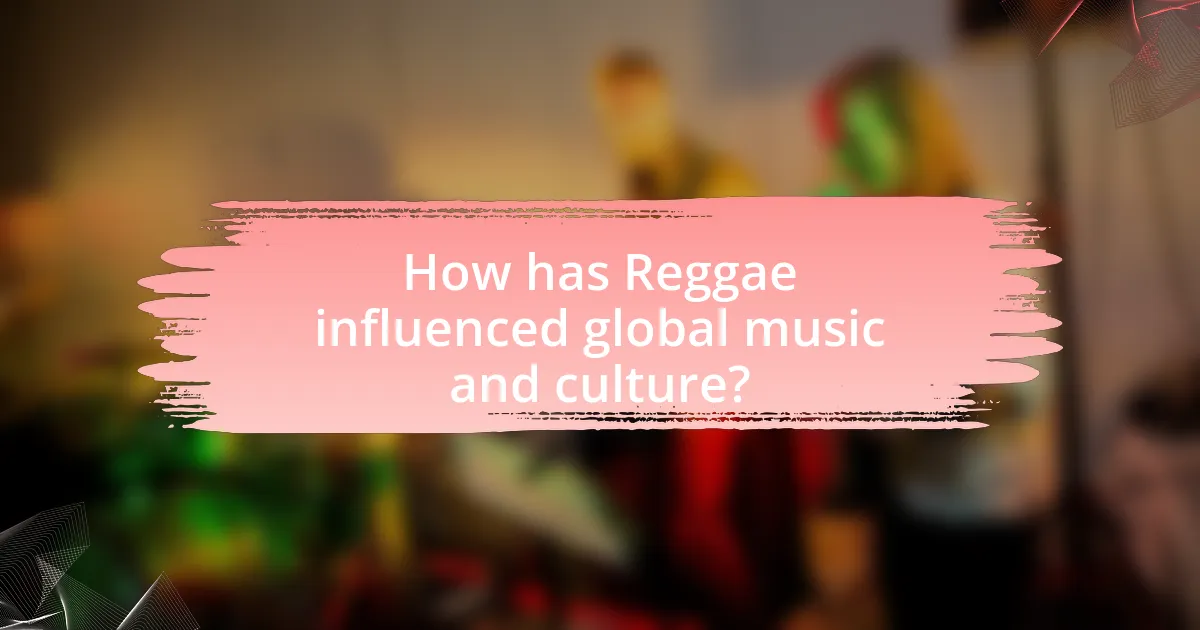
How has Reggae influenced global music and culture?
Reggae has profoundly influenced global music and culture by introducing distinctive rhythms, social themes, and a unique sound that has permeated various genres worldwide. The genre’s signature offbeat guitar strumming and bass-heavy sound have inspired artists across rock, hip-hop, and pop, leading to the emergence of subgenres like reggae fusion and dancehall. Additionally, reggae’s emphasis on social justice, peace, and resistance against oppression has resonated globally, influencing movements such as Rastafarianism and promoting awareness of issues like poverty and inequality. The global reach of reggae is evidenced by its incorporation into mainstream music, with artists like Eric Clapton and No Doubt achieving commercial success through reggae-influenced tracks. Furthermore, the annual Reggae Sumfest in Jamaica and the proliferation of reggae festivals worldwide highlight the genre’s cultural significance and enduring legacy.
What impact has Reggae had on other music genres worldwide?
Reggae has significantly influenced various music genres worldwide, particularly through its rhythmic patterns, lyrical themes, and cultural elements. The genre has contributed to the development of styles such as ska, rocksteady, dub, and dancehall, which have roots in reggae. Additionally, reggae’s impact extends to genres like hip-hop, where artists incorporate reggae rhythms and sampling techniques, as seen in tracks by musicians like The Beastie Boys and Sean Paul. Furthermore, reggae has shaped the sound of pop music, with artists like Rihanna and Ed Sheeran drawing on reggae influences in their work. The global reach of reggae is evidenced by its incorporation into music scenes in countries such as the UK, where it helped spawn the genre of UK reggae, and in Africa, where it has inspired local artists to blend traditional sounds with reggae elements.
How has Reggae inspired genres like Hip-Hop and Punk?
Reggae has significantly inspired genres like Hip-Hop and Punk through its rhythmic patterns, lyrical themes, and cultural messages. Hip-Hop artists have adopted reggae’s syncopated beats and sampling techniques, with tracks like “Rapper’s Delight” incorporating reggae rhythms, while artists such as The Beastie Boys have explicitly referenced reggae in their music. In Punk, bands like The Clash and Bad Brains have integrated reggae’s offbeat guitar strumming and socially conscious lyrics, reflecting the genre’s roots in rebellion and resistance. The cross-pollination of these genres illustrates reggae’s foundational influence on the evolution of contemporary music styles.
What are some notable collaborations between Reggae artists and musicians from other genres?
Notable collaborations between Reggae artists and musicians from other genres include the partnership between Bob Marley and The Wailers with Eric Clapton on the song “I Shot the Sheriff,” which helped introduce reggae to a wider rock audience. Additionally, the collaboration between Damian Marley and Nas on the album “Distant Relatives” blends reggae with hip-hop, showcasing the genre’s versatility. Another significant collaboration is between Sean Paul and Beyoncé on the track “Baby Boy,” which topped the Billboard Hot 100 chart, further highlighting reggae’s influence in pop music. These collaborations exemplify reggae’s ability to transcend genres and reach diverse audiences.
In what ways has Reggae music influenced social movements and activism?
Reggae music has significantly influenced social movements and activism by serving as a powerful medium for political expression and social commentary. Artists like Bob Marley and Peter Tosh used their music to address issues such as poverty, racial inequality, and human rights, galvanizing listeners to engage in activism. For instance, Marley’s song “Get Up, Stand Up” became an anthem for civil rights movements, encouraging people to fight against oppression. Additionally, reggae’s roots in Rastafarian culture promote messages of unity and resistance against colonialism, further inspiring global movements for social justice. The genre’s ability to resonate with marginalized communities has made it a vital tool for raising awareness and mobilizing action around social issues.
How have Reggae artists used their platform to address political issues?
Reggae artists have utilized their platform to address political issues by incorporating social and political commentary into their music, often highlighting themes of resistance, injustice, and empowerment. For instance, artists like Peter Tosh and Bob Marley explicitly addressed issues such as colonialism, poverty, and human rights in their lyrics, with songs like “Get Up, Stand Up” and “Equal Rights” advocating for social change and justice. Additionally, contemporary reggae artists continue this tradition, using their music to raise awareness about issues like police brutality and systemic racism, as seen in the works of artists such as Protoje and Koffee. This approach not only resonates with audiences but also mobilizes listeners to engage in political discourse and activism, demonstrating the genre’s enduring influence on social movements globally.
What role does Reggae play in promoting cultural identity and unity?
Reggae plays a crucial role in promoting cultural identity and unity by serving as a vehicle for expressing the social, political, and spiritual experiences of marginalized communities, particularly in Jamaica. The genre’s roots in Rastafarianism and its emphasis on themes such as resistance, love, and community solidarity foster a sense of belonging among listeners. For instance, the lyrics of iconic reggae songs often address issues like inequality and oppression, which resonate deeply with audiences, reinforcing their cultural identity. Additionally, reggae’s global reach has led to the formation of diverse communities that celebrate this music, further uniting people across different backgrounds and promoting cross-cultural understanding. The impact of reggae on cultural identity is evidenced by its recognition as a UNESCO Intangible Cultural Heritage, highlighting its significance in fostering unity and cultural pride worldwide.
How has Reggae music been received in different parts of the world?
Reggae music has been received with varying degrees of popularity and cultural integration across different parts of the world. In Jamaica, reggae is a foundational genre, deeply intertwined with the nation’s identity and history, often associated with social and political movements. In the United States, reggae gained significant traction in the 1970s, particularly through artists like Bob Marley, leading to a fusion with other genres such as hip-hop and rock, which has resulted in a diverse reggae-influenced music scene. In Europe, particularly in the UK, reggae has influenced the development of genres like dub and ska, with a strong following that has led to numerous festivals celebrating reggae culture. In Africa, reggae resonates with themes of resistance and empowerment, particularly in countries like Zimbabwe and South Africa, where local artists have adapted the genre to reflect their cultural narratives. Overall, reggae’s global reception illustrates its adaptability and enduring appeal, as it continues to inspire and connect diverse audiences worldwide.
What are some examples of Reggae’s popularity in non-Caribbean countries?
Reggae has gained significant popularity in non-Caribbean countries, particularly in the United Kingdom, the United States, and Japan. In the United Kingdom, reggae music became prominent in the 1970s, with artists like Steel Pulse and UB40 achieving mainstream success, and the genre influencing the British punk scene. In the United States, reggae has been embraced by diverse audiences, with Bob Marley’s music topping charts and festivals like Reggae on the River attracting thousands. Japan has also seen a growing reggae scene, with local artists and festivals celebrating the genre, reflecting its cultural impact and popularity in the country.
How do local cultures adapt and reinterpret Reggae music?
Local cultures adapt and reinterpret Reggae music by infusing it with their own musical styles, languages, and cultural narratives. For instance, in Brazil, Reggae has merged with local genres like Samba and Bossa Nova, creating a unique sound that reflects Brazilian rhythms and social issues. Similarly, in Japan, artists incorporate traditional Japanese instruments and melodies into Reggae, resulting in a distinct fusion that resonates with Japanese audiences. This adaptation process is evident in the emergence of localized Reggae festivals and the creation of songs that address local themes, demonstrating how Reggae serves as a platform for cultural expression and social commentary across diverse communities.
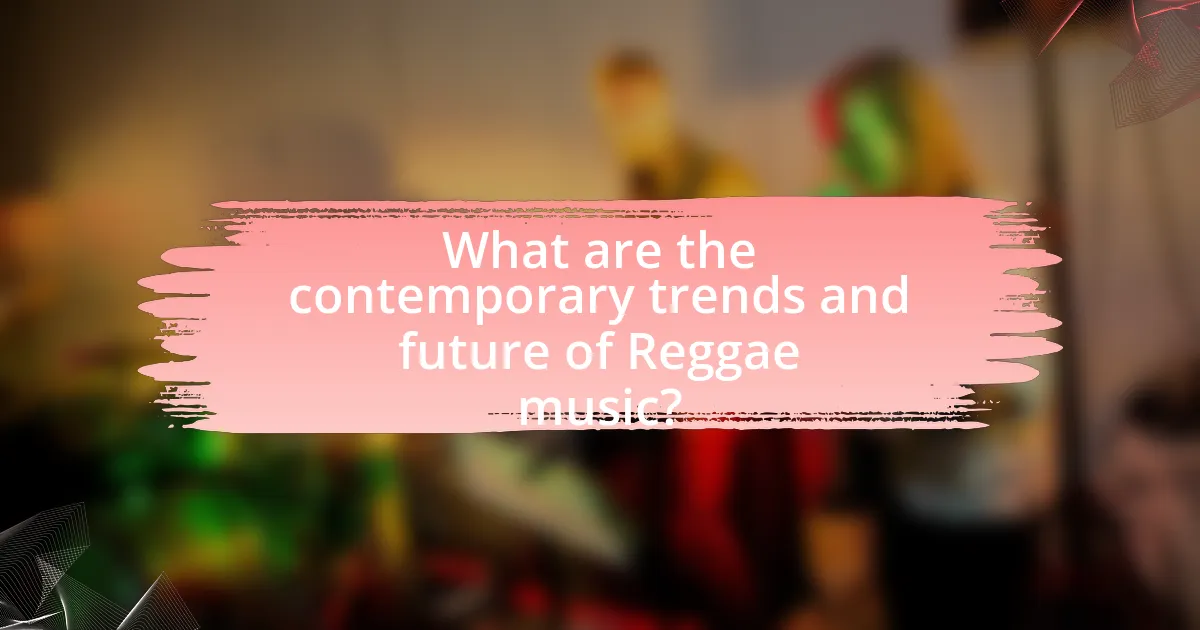
What are the contemporary trends and future of Reggae music?
Contemporary trends in Reggae music include the fusion of traditional Reggae with genres like hip-hop, dancehall, and electronic music, reflecting a globalized sound that appeals to diverse audiences. This evolution is evident in the rise of artists such as Protoje and Koffee, who incorporate modern production techniques and lyrical themes that resonate with younger generations. The future of Reggae music is likely to see further international collaborations and the integration of technology, such as virtual performances and streaming platforms, which enhance accessibility and reach. Additionally, the genre’s emphasis on social and political issues continues to inspire new artists, ensuring that Reggae remains relevant in addressing contemporary global challenges.
How is Reggae evolving in the digital age?
Reggae is evolving in the digital age through increased accessibility and global reach facilitated by streaming platforms and social media. Artists can now distribute their music directly to audiences worldwide without traditional gatekeepers, leading to a diversification of styles and influences within the genre. For instance, platforms like Spotify and YouTube have enabled reggae artists to gain international followings, as seen with the rise of artists like Protoje and Koffee, who blend reggae with contemporary genres such as hip-hop and pop. Additionally, social media allows for real-time engagement with fans, fostering a community that transcends geographical boundaries. This evolution reflects a broader trend in music where digital tools empower artists to innovate and connect with diverse audiences.
What role do streaming platforms play in the distribution of Reggae music?
Streaming platforms are crucial in the distribution of Reggae music by providing global accessibility and exposure to artists. These platforms, such as Spotify and Apple Music, allow users to discover and listen to Reggae tracks from anywhere in the world, significantly increasing the genre’s reach beyond traditional markets. According to a report by the International Federation of the Phonographic Industry (IFPI), streaming accounted for 62.1% of global recorded music revenue in 2020, highlighting its importance in music distribution. This accessibility enables both established and emerging Reggae artists to connect with diverse audiences, fostering a broader appreciation for the genre and its cultural significance.
How are new technologies influencing Reggae production and collaboration?
New technologies are significantly influencing Reggae production and collaboration by enabling artists to access advanced tools for music creation and distribution. Digital audio workstations (DAWs) like Ableton Live and Pro Tools allow producers to create high-quality tracks from home studios, reducing the need for expensive studio time. Additionally, platforms such as SoundCloud and Bandcamp facilitate global collaboration, allowing artists from different regions to connect and share their work easily. The rise of social media has also transformed how Reggae artists promote their music, reaching wider audiences without traditional marketing barriers. These technological advancements have democratized music production, allowing for a more diverse range of voices and styles within the Reggae genre.
What are the emerging artists and sub-genres within Reggae today?
Emerging artists in reggae today include Koffee, Protoje, and Jesse Royal, who are gaining international recognition for their innovative sounds. Sub-genres within reggae that are currently rising include reggae fusion, which blends traditional reggae with elements of hip-hop and R&B, and dancehall, which continues to evolve with influences from electronic music. Koffee’s Grammy-winning debut EP “Rapture” showcases the fusion of reggae with contemporary styles, while Protoje’s work often incorporates hip-hop rhythms, reflecting the genre’s adaptability and global appeal.
Who are the rising stars in the Reggae scene?
The rising stars in the Reggae scene include artists such as Koffee, Protoje, and Jesse Royal. Koffee gained international recognition with her Grammy-winning EP “Rapture,” showcasing her unique blend of reggae and dancehall. Protoje has been pivotal in the modern reggae revival, with his album “A Matter of Time” receiving critical acclaim and commercial success. Jesse Royal is known for his powerful lyrics and has been influential in the roots reggae movement, particularly with his album “Lily of Da Valley.” These artists are shaping the future of reggae music and expanding its global reach.
What new styles and influences are shaping modern Reggae music?
Modern Reggae music is being shaped by new styles and influences such as Dancehall, Hip-Hop, and electronic music. Dancehall, which emerged in the late 1970s, has introduced faster rhythms and a more aggressive vocal style, influencing contemporary Reggae artists like Protoje and Koffee. Additionally, the integration of Hip-Hop elements, including rapping and sampling, has broadened the genre’s appeal, as seen in collaborations between Reggae artists and Hip-Hop musicians. Electronic music has also played a significant role, with producers incorporating digital sounds and beats, leading to sub-genres like Dubstep Reggae. These influences reflect the genre’s evolution while maintaining its roots in Jamaican culture.
What can fans do to support the Reggae music community?
Fans can support the Reggae music community by purchasing music and merchandise from artists, attending live performances, and promoting Reggae music on social media platforms. Purchasing music directly supports artists financially, while attending concerts helps sustain the live music scene, which is vital for the genre’s growth. Promoting Reggae music online increases its visibility and encourages new listeners, contributing to the community’s expansion. According to a report by the International Federation of the Phonographic Industry, direct music sales and live performances are significant revenue sources for artists, highlighting the importance of fan engagement in sustaining the Reggae music ecosystem.
How can listeners engage with and promote Reggae artists and events?
Listeners can engage with and promote Reggae artists and events by actively participating in social media campaigns, attending live performances, and sharing music through streaming platforms. Social media platforms like Instagram and Twitter allow fans to interact directly with artists, share their content, and create buzz around upcoming events. Attending concerts and festivals not only supports artists financially but also helps in building a community around the genre. Furthermore, streaming platforms such as Spotify and Apple Music enable listeners to share playlists and recommend songs, increasing visibility for Reggae artists. According to a 2021 report by the International Federation of the Phonographic Industry, streaming has become a primary way for fans to discover new music, highlighting the importance of listener engagement in promoting artists.
What are some best practices for discovering new Reggae music and artists?
To discover new Reggae music and artists, utilize streaming platforms like Spotify and Apple Music, which offer curated playlists and algorithm-driven recommendations based on listening habits. Engaging with social media platforms, particularly Instagram and TikTok, allows fans to follow emerging artists and trends in real-time. Additionally, attending live music events and festivals dedicated to Reggae can provide firsthand exposure to new talent. Exploring music blogs and websites that focus on Reggae can also yield insights into up-and-coming artists. According to a report by the International Federation of the Phonographic Industry, streaming services have become the primary way listeners discover new music, highlighting their importance in finding new Reggae artists.
